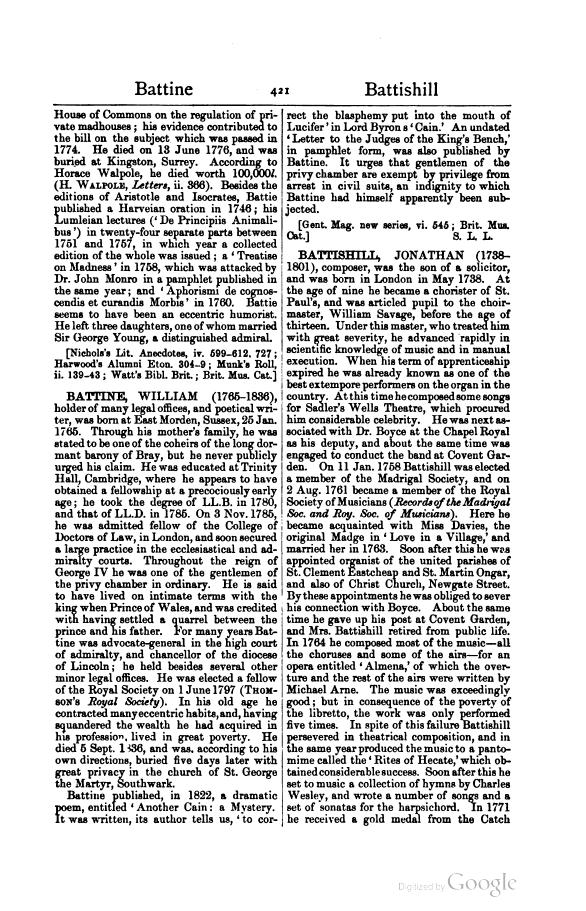House of Commons on the regulation of private madhouses; his evidence contributed to the bill on the subject which was passed in 1774. He died on 13 June 1776, and was buried at Kingston, Surrey. According to Horace Walpole, he died worth 100,000l. (H. Walpole, Letters, ii. 366). Besides the editions of Aristotle and Isocrates, Battie published a Harveian oration in 1746; his Lumleian lectures (‘De Principiis Animalibus’) in twenty-four separate parts between 1751 and 1757, in which year a collected edition of the whole was issued; a ‘Treatise on Madness’ in 1758, which was attacked by Dr. John Monro in a pamphlet published in the same year; and ‘Aphorismi de cognoscendis et curandis Morbis’ in 1760. Battie seems to have been an eccentric humorist. He left three daughters, one of whom married Sir George Young, a distinguished admiral.
[Nichols's Lit. Anecdotes, iv. 599–612, 727; Harwood's Alumni Eton. 304–9; Munk's Roll, ii. 139–43; Watt's Bibl. Brit.; Brit. Mus. Cat.]
BATTINE, WILLIAM (1765–1836), holder of many legal offices, and poetical writer, was born at East Morden, Sussex, 25 Jan. 1765. Through his mother's family, he was stated to be one of the coheirs of the long dormant barony of Bray, but he never publicly urged his claim. He was educated at Trinity Hall, Cambridge, where he appears to have obtained a fellowship at a precociously early age; he took the degree of LL.B. in 1780, and that of LL.D. in 1785. On 3 Nov. 1785, he was admitted fellow of the College of Doctors of Law, in London, and soon secured a large practice in the ecclesiastical and admiralty courts. From the year 1812 until 1827 he was one of the gentlemen of the privy chamber in ordinary. He is said to have lived on intimate terms with the king when Prince of Wales, and was credited with having settled a quarrel between the prince and his father. For many years Battine was advocate-general in the high court of admiralty, and chancellor of the diocese of Lincoln; he held besides several other minor legal offices. He was elected a fellow of the Royal Society on 1 June 1797 (Thomson's Royal Society). In his old age he contracted many eccentric habits, and, having squandered the wealth he had acquired in his profession, lived in great poverty. He died 5 Sept. 1836, and was, according to his own directions, buried five days later with great privacy in the church of St. George the Martyr, Southwark.
Battine published, in 1822, a dramatic poem, entitled ‘Another Cain: a Mystery.’ It was written, its author tells us, ‘to correct the blasphemy put into the mouth of Lucifer’ in Lord Byron's ‘Cain.’ An undated ‘Letter to the Judges of the King's Bench,’ in pamphlet form, was also published by Battine. It urges that gentlemen of the privy chamber are exempt by privilege from arrest in civil suits, an indignity to which Battine had himself apparently been subjected.
[Gent. Mag. new series, vi. 545; Brit. Mus. Cat.]
BATTISHILL, JONATHAN (1738–1801), composer, was the son of a solicitor, and was born in London in May 1738. At the age of nine he became a chorister of St. Paul's, and was articled pupil to the choirmaster, William Savage, before the age of thirteen. Under this master, who treated him with great severity, he advanced rapidly in scientific knowledge of music and in manual execution. When his term of apprenticeship expired he was already known as one of the best extempore performers on the organ in the country. At this time he composed some songs for Sadler's Wells Theatre, which procured him considerable celebrity. He was next associated with Dr. Boyce at the Chapel Royal as his deputy, and about the same time was engaged to conduct the band at Covent Garden. On 11 Jan. 1758 Battishill was elected a member of the Madrigal Society, and on 2 Aug. 1761 became a member of the Royal Society of Musicians (Records of the Madrigal Soc. and Roy. Soc. of Musicians). Here he became acquainted with Miss Davies, the original Madge in ‘Love in a Village,’ and married her in 1763. Soon after this he was appointed organist of the united parishes of St. Clement Eastcheap and St. Martin Ongar, and also of Christ Church, Newgate Street. By these appointments he was obliged to sever his connection with Boyce. About the same time he gave up his post at Covent Garden, and Mrs. Battishill retired from public life. In 1764 he composed most of the music—all the choruses and some of the airs—for an opera entitled ‘Almena,’ of which the overture and the rest of the airs were written by Michael Arne. The music was exceedingly good; but in consequence of the poverty of the libretto, the work was only performed five times. In spite of this failure Battishill persevered in theatrical composition, and in the same year produced the music to a pantomime called the ‘Rites of Hecate,’ which obtained considerable success. Soon after this he set to music a collection of hymns by Charles Wesley, and wrote a number of songs and a set of sonatas for the harpsichord. In 1771 he received a gold medal from the Catch
